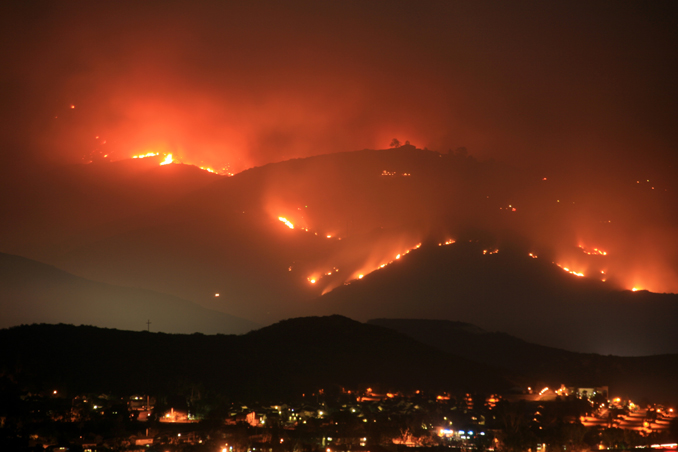

Late summer is wildfire season in much of America, and when those fires hit there’s nothing you can do but evacuate. There is plenty, however, that you can do in advance. Have you taken the necessary steps to protect your home and property from a wildfire?
Here are some essential questions to consider:
- Have you created a defensible space?
- Do you have a tile or other non-combustible roof, free of debris and overhanging trees?
- Is your address clearly displayed on the street and is your driveway accessible for fire-fighting equipment?
- Have you done everything in your power to protect your home, property and yourself?
When wildfires strike, it’s unrealistic to expect that the fire department can save every home—firefighters must work ahead of the fire and make tough choices about which homes they can save and which they cannot. It’s up to you to ensure your home can defend itself.
First things first: have an evacuation plan. Did you know that most wildfire-related injuries and deaths happen during evacuation efforts? Dense smoke limits visibility and oxygen, making it difficult for you to breath and even for your car to operate. Extreme heat and flying embers in the air can lead to costly mistakes—by even the most prudent of homeowners. You may not be thinking clearly while trying to save your family, animals, and dearest possessions.
Before that day comes, take these vital precautions:
- Have pre-planned evacuation routes—at least two
- Make a list of important items, and back them up in the Cloud so you can access them anywhere. Your list should include:
- Personal records
- Insurance information
- Phone numbers
- Prescriptions
- Assemble an Emergency Supply Kit or purchase one from the Red Cross
- Design a neighborhood network:
- Develop a phone tree—you call three people and they each call three people, and so on
- Know who may need assistance, including older adults, families with children, and individuals with mobility issues
- Have a plan for your horses and pets
- Evacuate large animals first and early.
- If you own a horse, you should have a horse trailer and know how to operate it
- Close all windows and turn off air conditioning or heating units
- Close fireplace doors and dampers
- Remove draperies and move furniture away from windows
- Remove combustibles from the home
- Stay calm and evacuate early
In extreme circumstances you may not be able to evacuate. Plan ahead! Ensure you have:
- Enough water for up to 2 weeks
- Battery-operated radios with back-up batteries
- Non-perishable canned goods and ready-to-eat meals for 2 weeks
In a widespread catastrophe it may take several days or even weeks to restore electricity and water. Your best option is to be prepared.
